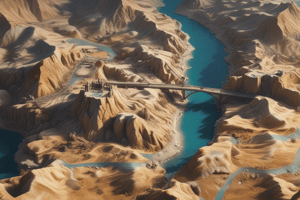Podcast
Questions and Answers
What is the relationship between flying height and photographic scale?
What is the relationship between flying height and photographic scale?
- Higher the flying height, smaller the scale (correct)
- Higher the flying height, larger the scale
- Flying height has no effect on the photographic scale
- Lower the flying height, smaller the scale
What is the point on the ground vertically beneath the perspective centre of the camera lens?
What is the point on the ground vertically beneath the perspective centre of the camera lens?
- Fiducial axis
- Perspective centre
- Ground Nadir (correct)
- Plumb line
What is the advantage of orthogonal projection in map-making?
What is the advantage of orthogonal projection in map-making?
- Distances, angles, and areas on the plane are independent of elevation differences (correct)
- It provides a 3D view of the area
- It is only used for aerial photography
- It allows for accurate terrain classification
What is the term for the distance from the optical centre of the lens to the focal plane when the camera is focused at infinity?
What is the term for the distance from the optical centre of the lens to the focal plane when the camera is focused at infinity?
What is the term used for two successive photographs taken during a flight line?
What is the term used for two successive photographs taken during a flight line?
What is the characteristic of an orthophoto that makes it an alternate to a map?
What is the characteristic of an orthophoto that makes it an alternate to a map?
What is the point on the photograph where the fiducial axes intersect?
What is the point on the photograph where the fiducial axes intersect?
What is the minimum amount of end lap required between aerial photographs in the same flight line?
What is the minimum amount of end lap required between aerial photographs in the same flight line?
What is the scale of a vertical photograph if a section line measures 150.62 mm, and the length of the section line on the map is 10.69 cm, with a map scale of 1/15000?
What is the scale of a vertical photograph if a section line measures 150.62 mm, and the length of the section line on the map is 10.69 cm, with a map scale of 1/15000?
What is the classification of terrain if the scale of the photograph is S = f / (H - h)?
What is the classification of terrain if the scale of the photograph is S = f / (H - h)?
What is the term used for the overlap between photographs in adjacent parallel flight lines?
What is the term used for the overlap between photographs in adjacent parallel flight lines?
What is the term used for the common overlap between three successive photographs?
What is the term used for the common overlap between three successive photographs?
What is the primary purpose of fiducial marks in photogrammetry?
What is the primary purpose of fiducial marks in photogrammetry?
What is the minimum tilt allowed for a photograph to be considered a vertical photograph?
What is the minimum tilt allowed for a photograph to be considered a vertical photograph?
What is the term used to describe the difference in elevation between two points on a stereoscopic pair of photographs?
What is the term used to describe the difference in elevation between two points on a stereoscopic pair of photographs?
What is the process of estimating the scale of a vertical photograph over a variable terrain?
What is the process of estimating the scale of a vertical photograph over a variable terrain?
What is the application of photogrammetry in environmental monitoring?
What is the application of photogrammetry in environmental monitoring?
What is the term used to describe the process of recording, measuring, and interpreting aerial photographic images and patterns of recorded radiant electromagnetic energy?
What is the term used to describe the process of recording, measuring, and interpreting aerial photographic images and patterns of recorded radiant electromagnetic energy?
Flashcards
Flying Height and Scale
Flying Height and Scale
The higher the flying height, the smaller the scale of the photograph. This means details on the ground will appear smaller in the photo taken at a higher altitude.
Ground Nadir
Ground Nadir
The point directly beneath the camera lens on the ground.
Orthogonal Projection
Orthogonal Projection
A map projection where distances, angles, and areas are independent of elevation differences. It's like looking straight down at a flat map.
Focal Length
Focal Length
The distance from the lens's center to the point where light focuses (focal plane) when the camera is focused at infinity.
Signup and view all the flashcards
Stereo-pair
Stereo-pair
Two photographs taken in sequence during a flight, covering overlapping areas of the ground.
Signup and view all the flashcards
Orthophoto
Orthophoto
A photograph with a constant scale throughout, making it a good alternative to a traditional map.
Signup and view all the flashcards
Photograph Centre
Photograph Centre
The point where the fiducial axes on a photograph intersect, representing the center point of the image.
Signup and view all the flashcards
End Lap
End Lap
The overlap between consecutive photographs taken in the same flight line, typically at least 60%.
Signup and view all the flashcards
Photo Scale
Photo Scale
The ratio between the distance on a photograph and the corresponding distance on the ground.
Signup and view all the flashcards
Variable Terrain
Variable Terrain
Terrain with varying elevations, causing the scale of the photograph to change.
Signup and view all the flashcards
Side Lap
Side Lap
The overlap between photographs taken in adjacent flight lines, ensuring continuous ground coverage.
Signup and view all the flashcards
Superlap
Superlap
The overlapping area of three consecutive photographs, where all three images provide information.
Signup and view all the flashcards
Fiducial Marks
Fiducial Marks
Markers placed on the edge of aerial photographs, forming a frame for accurate measurements.
Signup and view all the flashcards
Vertical Photograph
Vertical Photograph
A photograph taken with a camera tilted no more than 30 degrees from vertical (almost directly overhead).
Signup and view all the flashcards
Parallax
Parallax
The difference in the apparent position of an object as seen from two different points, used in stereoscopic viewing of aerial photographs.
Signup and view all the flashcards
Geometry of a Vertical Photograph
Geometry of a Vertical Photograph
The process of calculating the scale of a vertical photograph taken over variable (uneven) terrain.
Signup and view all the flashcards
Photogrammetry
Photogrammetry
The science and art of obtaining reliable measurements and information from photographic images, especially aerial photographs.
Signup and view all the flashcards
Photogrammetry in Environmental Monitoring
Photogrammetry in Environmental Monitoring
Used to estimate the volume of legacy waste, track deforestation, monitor land changes over time etc.
Signup and view all the flashcardsStudy Notes
Aerial Photographs and Photogrammetry
- Aerial photographs are exposed to have an overlap of 60% between successive photographs in a flight line, called "end lap", and between adjacent parallel flight lines, called "side lap".
- This overlap enables generating 3D views of common areas between two successive photographs.
Types of Photographs
- Vertical photograph: exposed with the optical axis of the camera coinciding with the direction of gravity.
- Tilted photograph: taken with the optical axis unintentionally tilted from the vertical by a small amount (less than 30°).
Photo Coordinate System
- Fiducial Marks: index marks rigidly connected with the camera lens, forming four sharp marks on the photographs.
- Flying Height: the height at which the aircraft flies when taking photographs, directly related to the photographic scale.
- Photograph Centre: the point on the photograph at the intersection of the fiducial axes.
Photogrammetry
- Definition: the art, science, and technology of obtaining reliable information about physical objects and the environment through recording, measuring, and interpreting aerial photographic images.
- Applications: estimation of legacy waste, and more.
Scale of a Vertical Aerial Photograph
- Formula for scale of a vertical photograph on flat terrain: 𝑓 𝑆= 𝐻 ′
- Formula for scale of a vertical photograph on variable terrain: 𝑆 𝐴= 𝑓 𝐻 − h
Other Key Concepts
- Superlap: the common overlap between three successive photographs.
- Stereoscope and parallax in stereoscopic views: used to find elevation differences.
- Orthophotos: aerial photographs rectified by combining photogrammetric principles with DEM data, with a uniform scale throughout.
Studying That Suits You
Use AI to generate personalized quizzes and flashcards to suit your learning preferences.




